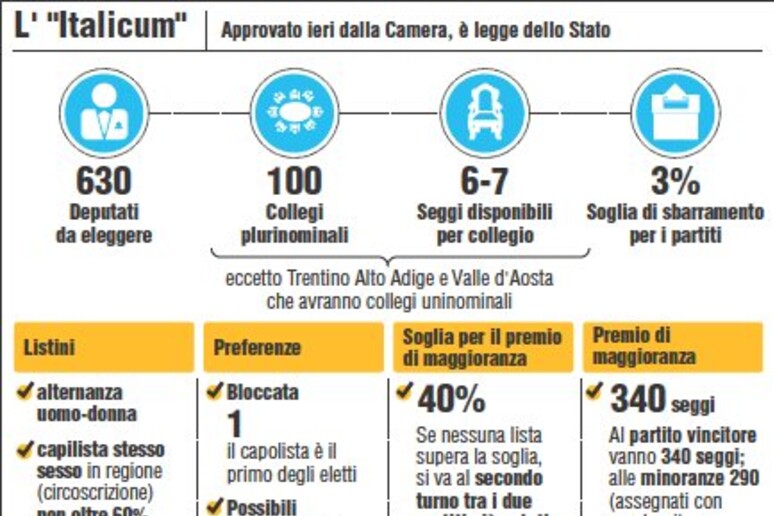The government's Italicum electoral reform bill won final approval on Monday-
Article 1 covers the way the Lower House is elected. It awards a 15% bonus to the party that obtains 40% of the popular vote, guaranteeing the winner an absolute majority.
The winner's bonus consists of 340 seats out of 630, bringing the winning party to 54% of overall seats.
A run-off vote decides who gets the winner's bonus if no party reaches 40%. Parties are not allowed to team up or form coalitions in the run-off vote.
This article should make sure the winning party has a governing majority, and also that it won't need to enter into coalitions in order to govern.
Losing parties which have garnered at least 3% of the national vote would divide the remaining 290 seats between them, in proportion to the number of votes won.
Article 1 also divides the national territory into 20 electoral districts - one per region - and these are subdivided into a total of 100 districts.
Voters can pick up to two candidates as well as the party list. Each party must present its list in alternating gender order, and voter preferences must be given to a man and a woman in the interests of gender equity, or the vote will be annulled.
The head of each party list in each district is blocked - that is, he or she is nominated by the party and automatically wins a seat in parliament if the party wins.
After that, the candidates with the most preferences get seats. The party that wins a majority will seat at least 240 candidates that have been picked through voter preferences.
The Italicum will be applicable as of July 1, 2016.
It only applies to the Lower House because a separate Constitutional reform bill is being designed to turn the Senate into a leaner assembly of regional government representatives with reduced lawmaking powers. If reforms are approved, the Upper House will no longer have the power to give or withdraw confidence in the government.
Confidence votes on electoral laws have only been called twice before in the history of modern Italy - once in 1923 with the ratification of the so-called Acerbo law, which consecrated the rise to power of the Fascist party, and again in 1953, when a Christian Democratic government pushed through a law awarding 65% of Lower House seats to the party or coalition that won over 50% of the vote.
ALL RIGHTS RESERVED © Copyright ANSA











